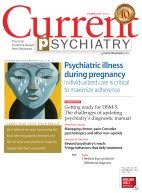Tawny L. Smith, PharmD, BCPP, Clinical Pharmacy Specialist, Psychiatry, Seton Family of Hospitals, Austin, TX, Assistant Professor, Department of Psychiatry, University of Texas Southwestern Medical School, Dallas, TX
Nick C. Patel, PharmD, PhD, BCPP, Clinical Pharmacist, LifeSynch, Inc. Las Colinas, TX, Clinical Assistant Professor, Department of Psychiatry and Health Behavior, Medical College of Georgia, Augusta, GA
Although antiepileptic drugs (AEDs) are used to treat a spectrum of psychiatric disorders, in some instances they are prescribed without clear evidence of clinical benefit or safety. When considering prescribing an AED, ask yourself:
Does the evidence show the drug is efficacious for my patient’s disorder or symptoms?
Which adverse effects are associated with this medication?
What are the advantages of monitoring the patient’s serum drug concentration?
This review provides an evidence-based framework regarding the safe and effective use of AEDs in psychiatric patients.


